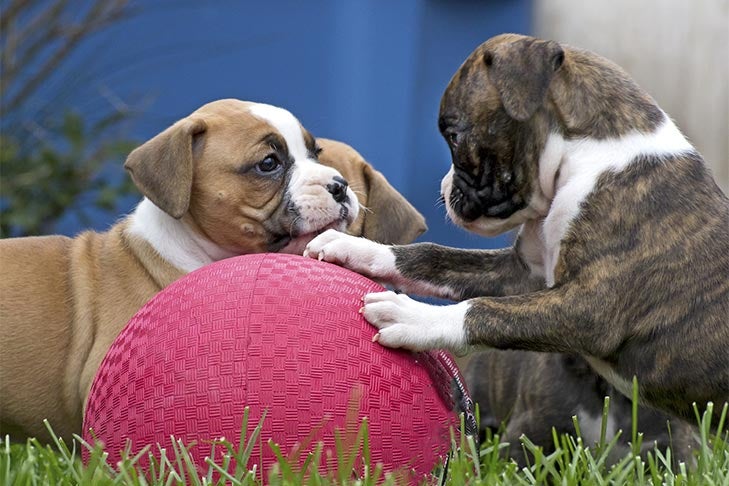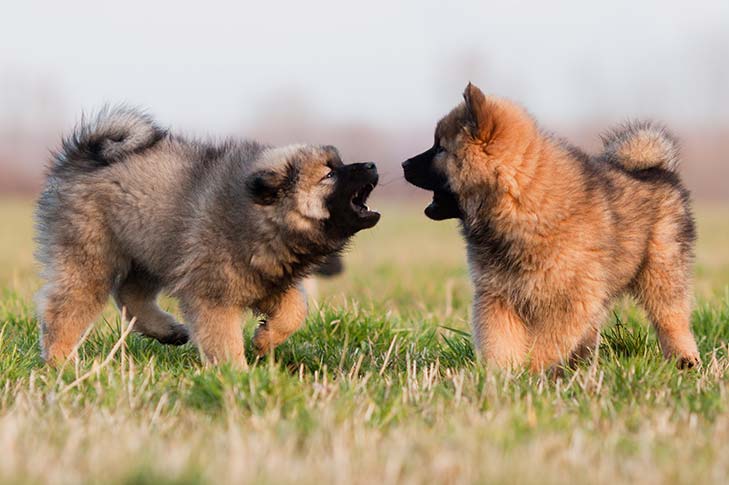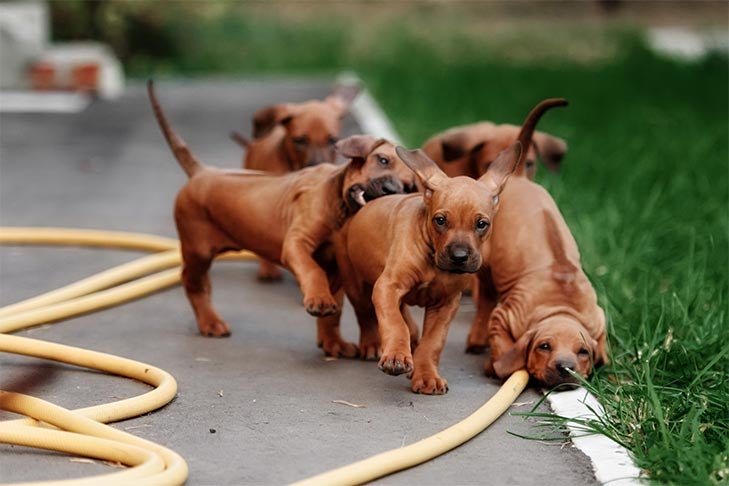
Nothing is more fun than introducing a litter of puppies to the world. Interactive playtime with balls, squeaky toys, climbing obstacles, and games of hide-and-seek helps puppies put their best paw forward on socialization. Add in children and seniors, backyards and basements, carpet and concrete, and puppies will be well on their way. Puppy socialization focuses on that sliver of time to shape puppies toward becoming confident, well-mannered and cooperative adult dogs.
“Puppies develop at a fast pace, so there is a small window of opportunity when they are from 5 to 16 weeks old to effect positive development,” says Pat Hastings, co-editor of Another Piece of the Puzzle: Puppy Development.
Hastings considers “bounceback,” puppies’ ability to recover from first being afraid, as one of the most valuable behavioral traits. Socialization reduces the number of things in the world that frighten a puppy by continually providing the experience of first being afraid and then recovering. The more things a puppy experiences during critical socialization periods, the less bothered the puppy will be throughout life when confronted by new things.

“The bounceback is critical, which is why you must never feed into a puppy’s insecurities,” says Hastings, a prominent puppy evaluator and seminar presenter. “You have to ignore puppies’ first fear reaction and let them figure it out for themselves without interference from you. If you ignore it, they usually will too. The next time, they likely will not give it a second thought. This is the bounceback.”
According to research by behaviorists John Paul Scott and John Fuller, a dog’s behavioral makeup is 35 percent genetic and 65 percent due to socialization, nutrition, health care, training, and management. In other words, socialization cannot change temperament. However, it certainly plays a role in behavior modification.
Enrichment Matters
Although puppies are born with the ability to be cooperative social partners with humans, socialization is the key to success in helping them develop confidence and the ability to handle new situations. Missed opportunities during the critical puppy socialization period put pups at risk of becoming shy, fearful, defensive adult dogs.
Animal behaviorist Michael W. Fox showed that puppies exposed to increasingly complex stimuli, or enrichment, sought out complex environments and were dominant over “stimulus poor” puppies. Those that lacked enrichment were inhibited, fearful and looked for less complex environments, and often compensated with self-destructive behaviors such as chewing and licking.
In a nutshell, the more puppies experience, the more accepting they become. In reality, socialization lasts the entire life of a dog. It should be consistent, firm but gentle, patient, and loving. It starts during that sliver of time from five to 16 weeks of age.
“Socialization requires creativity and must occur during this critical period of development,” Hastings says. “There is no substitution for intensive and ongoing socialization for all puppies.”
Stages of Puppy Socialization & Development
Puppy socialization sets the stage for a dog’s entire life. The socialization that Pat Hastings identifies are:
Curiosity Period (5 to 7 weeks)
Now weaned, puppies are virtually fearless and thus ready to explore the world. They want to climb, crawl, investigate, and taste everything. Their acceptance of people peaks at this as they are becoming increasingly mobile. New challenges, such as first baths, grooming, and trips outside the house, are ideal because puppies bounce back quickly if frightened by something new.
Behavioral Refinement (7 to 9 weeks)
Puppies are capable of learning anything despite their short attention span. Learning is permanent at this age. Training should be structured on an individual basis, and puppies should form good habits, learn boundaries, and the rules of their new life. A stable individualized learning environment is important.

Fear Imprint (8 to 11 weeks)
Between 8 and 9 weeks of age, puppies begin to be more cautious, even fearful of loud noises, sudden movements, strangers, and discipline from other dogs or humans. If frightened during this period, it may take weeks to return to normal. In non-socialized puppies, anything associated with fear at this age will be a fearful stimuli throughout life without extensive desensitization.
Environmental Awareness (9 to 12 weeks)
Puppies are starting to learn the right behaviors for the right time. They’re significantly improving their motor skills, paying more attention to humans, and are busy learning about their new world. Behavior can be shaped very differently depending on what the owner expects from the puppy. If almost totally separated from other dogs, the human bond becomes strong. Puppies left with littermates often have trouble with separation anxiety and/or hyperexcitability.
Seniority Classification (13 to 16 weeks)
The age of independence, this is when a puppy begins to test dominance and leadership. Critical learning occurs now. Puppies that are allowed to bite, dominate children or resist activities such as leash training, nail cutting and removal of food possessions are less likely to develop into a well-behaved dog. Puppy classes are essential, and being handled and trained by a variety of people helps build self-confidence.


